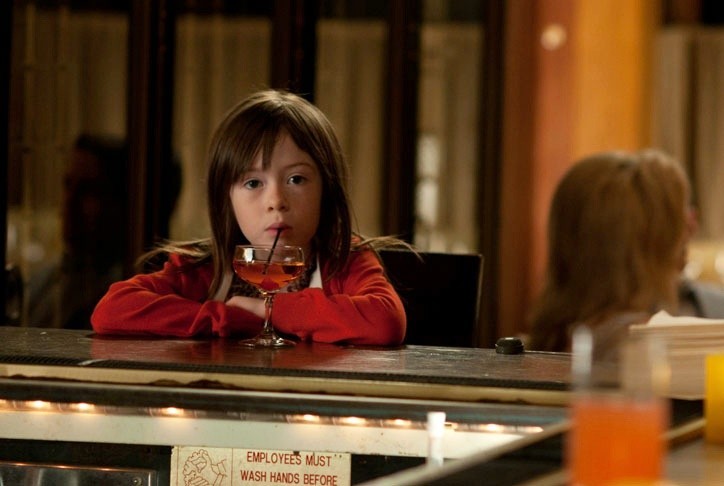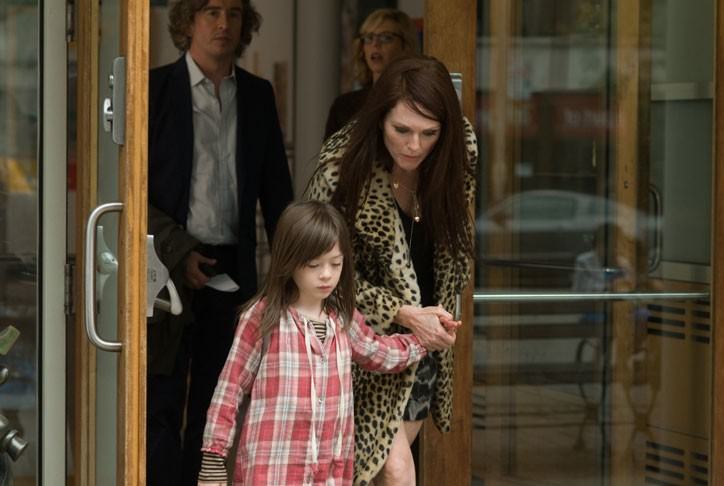It is more common than not that a movie fails to measure up to the literary masterpiece that inspired it. But the particular failures of What Maisie Knew, the new film based on Henry James’s 1897 novel, seem uncommonly revealing—both about the relative possibilities and limitations of the printed word and the screen, and about the differences between the moral climate of James’s era and that of our own.
Written not long after the debacle that ended his foray into playwriting and before he adopted the highly convoluted sentence structure that characterized his late period, What Maisie Knew tracks the plight of Maisie Farange, whose parents, Beale and Ida, are already in divorce litigation as the book begins. Reading it, you can’t help pitying the hapless little girl trapped in the crossfire of a bellicose and bitter split. Maisie’s equally reprehensible father and mother are the most thinly drawn of the novel’s major characters. Beale is a parasitical bounder who lives off women, Ida a faithless, shallow slut obsessed with men and billiards. Both seem to exist largely to underestimate and insult their daughter, to introduce her to their contaminating, unwholesome lovers, and “for the harm they could, with her unconscious aid, do each other.”
The film, directed by Scott McGehee and David Siegel, transposes the novel’s setting from nineteenth-century England to contemporary Manhattan. Maisie’s parents—thanks to the strong performances delivered by Julianne Moore and Steve Coogan—are not only far more nuanced and interesting than their fictional counterparts but dominate every scene in which they appear. You can see, on Moore’s expressive face, the strain and anxiety of an aging rock star trying to revive her career, and Coogan captures the bewilderment of a middle-aged art dealer beginning to face the fact that his charm can no longer compensate for his deficiencies of character. Overshadowed by her flawed but fascinating mother and father, Maisie (played by the sympathetic young actress Onata Aprile) is reduced to the obedient, endlessly accommodating, and improbably well-behaved cipher she might have been in the book, had James not devoted so much of his energy into detailing every significant and minute shift in her understanding of herself and of the adults around her.
From the opening pages, James merges the voice and the perspective of the author with that of his young protagonist, thus boldly circumventing any doubts about whether a child would use the word objurgation. Mixing dramatic scenes with long passages of narration, disproving the creative-writing-workshop advice to “show” rather than “tell,” James is able to compress a great deal of information into a short space and to delve ever more deeply into Maisie’s psyche.
The elegance, intelligence, and delicacy of James’s prose style colors—and soon becomes indistinguishable from—our view of Maisie, an effect that is nearly impossible to reproduce in a film, except perhaps through the use of voice-over, which most often has the irritating effect of someone insistently talking to us while we are trying to concentrate on something else. Without a narrator reading aloud from the novel, it’s hard to imagine how passages such as the following could be translated into remotely credible dialogue or action:
She had a new feeling, the feeling of danger; on which a new remedy rose to meet it, the idea of an inner self, or, in other words, of concealment. She puzzled out with imperfect signs, but with a prodigious spirit, that she had been a centre of hatred and a messenger of insult… Her parted lips locked themselves with a determination to be employed no longer. She would forget everything, she would repeat nothing, and when, as a tribute to the successful application of her system, she began to be called a little idiot, she tasted a pleasure new and keen… She saw more and more; she saw too much.
Unable to convey the psychological depth and preternatural maturity that James gives his fictional heroine, McGehee and Siegel have turned Maisie into a wide-eyed, passive observer, watching the grown-ups misbehave, freely giving the comforting and consoling hugs that her parents seem to need, and never showing the slightest sign of the temper, exhaustion, or exasperation. Even when she is forgotten by all her caretakers and awakens to find that she has been left to spend the night with slightly scary strangers, Maisie sheds but a single tear—instead of screaming her head off, which, under the circumstances, might seem a more appropriate reaction. Such moments make us acutely aware that, while James informs the reader about every new development in Maisie’s consciousness, the filmmakers more often fail to give us any clear sense of what the little girl is thinking.
Advertisement
In the novel, Maisie’s father marries her governess, Miss Overmore, and Ida Farange weds a younger man, Sir Claude. Maisie introduces the new spouses, and they proceed to fall in love. Maisie is left largely in the care of Mrs. Wix, the elderly governess hired to replace Miss Overmore. While the screenplay follows a similar arc, the excision from the plot of Mrs. Wix, the novel’s only truly loyal and reliable adult, changes everything. In turn, the moral character of both of the people who become Maisie’s step-parents—Margo, the young woman who had been her babysitter (played by Joanna Vanderham), and Lincoln, a young bartender (Alexander Skarsgard)—has been radically improved. Margo and Lincoln are not only young but genuine and loving, and the effect of their physical beauty is telegraphed more rapidly and directly than even Henry James—or any writer—can manage. Unlike their more calculating and opportunistic fictional counterparts, they enter whole-heartedly into the new relationships that are inevitably sabotaged by the same unattractive personality traits that torpedoed Maisie’s parents’ marriage; and when these new unions founder, their hearts are (briefly) broken. They begin as, and remain, Maisie’s saviors. Once they conquer their prudent reservations about the vaguely incestuous aspects of their attraction and admit that they belong together, they provide the safe harbor where Maisie can at last find refuge from the harrowing storms of her childhood.
Things are far more ambiguous in the novel. Maisie’s stepfather, the handsome but weak-willed Sir Claude, emerges as one of its most sharply observed creations. Thoughtful, attentive, charming, the opposite of Beale Farange, he is the sort of man no female can resist, regardless of her age, social station, intelligence, or level of experience. In a startling but wholly persuasive moment, both Mrs. Wix and Maisie admit that they “adore” him; among the bonds that unite the old woman and the young girl is their shared love for Sir Claude, who flirts with Mrs. Wix and, perhaps sensing the faintly erotic nature of his step-daughter’s attachment to him, defuses it by addressing her with a variety of endearments—“dear boy” and “old fellow”—more suitable for a male friend. One can hardly imagine the film’s directors, Scott McGehee and David Siegel, electing to muddy a simple moral equation (selfish parents = bad, open-hearted step-parents = good) with anything remotely resembling James’s observation of how intensely a little girl can “adore” a male adult without their relationship being abusive or inappropriate.
If James disapproves of Sir Claude, it’s not because he has (emotionally) seduced three adult women and a child, but because he is an adulterer, a category that no longer appears to matter in stylish, modern downtown Manhattan—especially if the adulterers are youthful, gorgeous, and “nicer” than the spouses on whom they are cheating. Sexual transgression, opportunism, and moral weakness is very much a problem for James and for Mrs. Wix, who in the book’s final section wages a battle for Maisie’s soul, a strenuous tug-of-war with Maisie’s step-parents, who attempt to persuade the girl to abandon Mrs. Wix and come live with them. Complicating matters still further is the fact that Sir Claude and the former Miss Overmore (now Mrs. Beale) are inconveniently impecunious, while Maisie is in possession of an inheritance, from a godmother, which would revert to her legal guardians. Thus the struggle for Maisie’s affections has a fiscal as well as an emotional aspect.
In the film version, the threat of poverty, like adultery, hardly registers. Presumably, Margo and Lincoln can resume their former jobs, as bartender and nanny, though it seems unlikely that they will be able to keep Maisie in the spectacular high-fashion that she has been wearing throughout—a different outfit in almost every shot. And the final scenes that bring Maisie, Lincoln, and Margo together in a (borrowed) beach house deftly avoid the question of how the little girl will adapt to life in settings far less comfortable and luxurious than the lavish apartment she has shared with her parents.
Both versions of the story conclude with Maisie’s being required to make a choice. For James the choice is between remaining with the steadfast Mrs. Wix or going off with her glamorous, vaguely dangerous, and far more exciting step-parents. Until the final pages, we are never quite sure what route Maisie plans to follow. When at last she does decide, we understand that everything that she has learned in the course of the novel, the moral conscience that she has acquired with great pain and at serious personal cost, has influenced and ultimately determined her choice. In the film, however, Maisie’s choice is a relatively simple one: her irresponsible, self-absorbed mother—who has abandoned her daughter to go on tour with her band—abruptly turns up at the beach house where Maisie has found happiness with Margo and Lincoln. When Maisie’s mother attempts to reclaim her, we are never for a moment in doubt about how the little girl will choose; and we may feel that anyone—any halfway reasonable grade-school student—would choose precisely as Maisie does.
Advertisement
Soon after completing What Maisie Knew, James wrote The Wings of the Dove—a novel in which he explores, and makes more explicit, a theme that he had begun to examine in the earlier work. That is, the power (not necessarily for the good) that naturally accrues to a couple who are in romantic and sexual thrall to one another. In the later novel, the pair, not entirely unlike Sir Claude and Miss Overmore, work their sinister magic on a dying young woman—an innocent who is, at least at first, even less prepared than Maisie to withstand and outwit their machinations.
Thinking about The Wings of the Dove may make you even more aware of how little the cinematic version of What Maisie Knew—a film that is nominally about marriage, divorce, adultery, remarriage, power, money, morality, and sex—has to say about any of those subjects, and how few risks it takes. Henry James’s complicated and courageous novel has been distilled down to a screed about the dangers and consequences of bad parenting. Do the filmmakers assume that their audience is incapable of dealing with the moral ambiguities that made the novel so profound, and that we prefer a safe, simplistic vision of a world in which wholesome, beautiful young people need worry neither about money nor about the mixture of vices and virtues that characterize the men and women in James’s fiction—and ourselves, and the people we know?
On the one hand, it’s gratifying to realize that someone else has noticed how many New York parents treat their children like infants or like adult confidants, and remain inseparable from their cell phones even as they are, in theory, spending “quality time” with the kids. On the other hand, it’s striking that a novel written more than a hundred years ago seems so much more modern—in every way more daring—than a film that has only lately appeared in our neighborhood theaters.
What Maisie Knew, a new film adaptation of Henry James’s novel directed by Scott McGehee and David Siegal, is now in general release.




